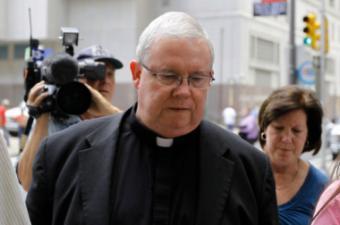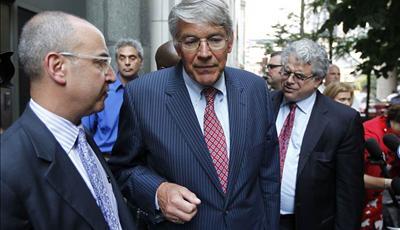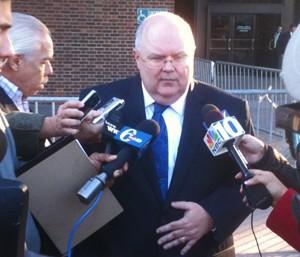|
| Appellate Judges in Msgr. Lynn Case Ask Philly D.A. Some Questions He Can't Answer
By Ralph Cipriano
Big Trial
September 18, 2013
http://www.bigtrial.net/2013/09/appellate-judges-in-msgr-lynn-case-ask.html
 |
Monsignor William J. Lynn
|
 |
Thomas A. Bergstrom (center)
|
 |
Hugh J. Burns Jr.
|
In a sunlight-drenched courtroom this morning, a couple of state appellate judges asked the Philadelphia district attorney's office to explain the pretzel logic of its suspect prosecution of Msgr. William J. Lynn.
After four years of hiding behind secret grand juries and gag orders, the D.A. finally had to answer some tough questions in broad daylight. Seth Williams wasn't there, but his top appellate lawyer was. He responded with a litany of legal citations. But when the judges attempted to pin him down, the bottom line was, the D.A.'s office has no real answers. It's hard to explain the illogical and the politically expedient.
Msgr. Lynn is now serving a 3 to 6 year prison term for his June 22, 2012 conviction on one count of endangering the welfare of a child. Could the appellate judges be contemplating a ruling that might free the defendant? There was a moment today during the intense 40-minute hearing that quickened the pulse of every defense lawyer in the packed courtroom.
It came when John T. Bender, the president judge of the 15-member appellate court, asked defense lawyer Thomas A. Bergstrom how long his client had been in jail. It was a question that seemingly came out of nowhere. The answer was 15 months. But it left defense lawyers wondering whether the appellate court was sending a signal that it would entertain a new bail motion to be filed on behalf of Msgr. Lynn.
"I don't know what to do; I don't want to be precipitous," a smiling Bergstrom told reporters after the hearing. Bergstrom said he would wait until the court issues a ruling on the Lynn appeal. And if that ruling favors his client, Bergstrom said, he'll be filing that bail motion about "five minutes later."
Today's hearing took place on the 17th floor of 530 Walnut Street, in an ornate courtroom featuring candle chandeliers and sconces, and tall windows overflowing with blinding sunlight.
The questions that the appellate judges asked that the D.A. couldn't answer concerned two subjects. The first was the D.A.'s flip-flop on the state's 1972 endangering the welfare of a child law, known as EWOC. The second was Judge M. Teresa Sarmina's decision to allow prosecutors in the Lynn trial to present 21 supplemental cases of past sex abuse dating back to 1948, three years before Lynn was born, to show a pattern of bad behavior in the Archdiocese of Philadelphia.
Let's start with the 1972 EWOC law. It says: "A parent, guardian or other person supervising the welfare of a child under 18 years of age commits a misdemeanor of the second degree if he knowingly endangers the welfare of a child by violating a duty of care, protection or support."
In 2005, then-District Attorney Lynne Abraham and a grand jury concluded that the 1972 EWOC law did not apply to Msgr. Lynn, Cardinal Anthony J. Bevilacqua, or any other high-ranking official of the Archdiocese of Philadelphia. A grand jury issued a report that said although it would like to, it could not legally indict Lynn or Bevilacqua for the crime of endangering the welfare of a child.
In 2011, a new district attorney, Seth Williams, and another grand jury looked at the same 1972 EWOC law and concluded that it did apply, not only to Msgr. Lynn, but also to Fathers Edward V. Avery, James J. Brennan and Charles Engelhardt, as well as a lay teacher, Bernard Shero. The grand jury indicted the four priests and the teacher, and charged them with endangering the welfare of a child.
The 1972 state EWOC law refers to "a parent, guardian or other person supervising the welfare of a child." The way the law has traditionally been applied usually involves an adult who has a relationship with a child, such as a parent, guardian or teacher; the law also requires a person who "knowingly endangers the welfare of a child." But in Msgr. Lynn's case, he was prosecuted for endangering the welfare of "a child he never met, he never knew existed at all," Bergstrom told the appellate judges.
Instead, Bergstrom said, Lynn was charged ex post facto," or after the fact, under the standards of an EWOC law amended in 2007 to include supervisors.
The 1972 EWOC law that makes it a crime to endanger the welfare of a child [EWOC] applies to "a parent, guardian or other person supervising the welfare of a child under 18 years of age."
The amended EWOC law, which took effect in 2007, applies not only to "a parent, guardian or other person supervising the welfare of a child under 18 years of age," but also to "a person that employs or supervises such a person." The law was amended after the 2005 grand jury report to specifically target supervisors such as Lynn.
"Lynn never supervised the child," Bergstrom told the appellate judges. Instead, Lynn supervised Father Avery, who pleaded guilty to raping a 10-year-old altar identified by the 2011 grand jury report as Billy Doe.
Judge John L. Musmanno asked Bergstrom if Lynn was guilty of "facilitating the crime." In other words, did Lynn "aid or abet" the rape of Billy Doe, the judge wanted to know.
Bergstrom returned to the language of the 1972 EWOC law. It required that the parent, guardian or person supervising the welfare of a child to "knowingly" endanger the welfare of that child, he said.
In Lynn's case, the alleged rape of Billy Doe, which took place during the 1998-99 school year, was not reported to the archdiocese until 2009. To find that Lynn was guilty of EWOC under the old law, you'd have to conclude that Avery "was some kind of virus," Bergstrom said.
Bergstrom argued that whatever bad acts were perpetrated by Avery were "not bad acts of Lynn."
"He had no knowledge of it," Bergstrom said.
Bergstrom then addressed the 21 supplemental cases of prior sex abuse allowed into trial by Judge Sarmina. Bergstrom said by his count, 26 of 32 trial days were taken up with hearing evidence from the supplemental cases. Only six days were spent on the alleged crimes behind the actual charges against Lynn. Bergstrom's position was that Judge Sarmina should have never allowed the 21 supplemental cases into evidence, as it prejudiced the jury, and had little or nothing to do with the alleged rape of Billy Doe by Avery.
Next up was Hugh J. Burns Jr. chief of the D.A.'s appeals unit.
Burns said the 21 supplemental cases of sex abuse were "probative and relevant" to Lynn's "knowledge and intent." Lynn had a history of transferring abusive priests in the archdiocese from parish to parish, without warning parishioners or parents, Burns said. He argued that under the old EWOC law, it was Lynn's responsibility to supervise the welfare of a child.
"That's your position?" asked Judge Bender.
It was.
"He [Lynn] didn't simply put Avery out there, he was systematically putting others out there," Burns said, referring to other abusive priests.
But Judge Bender cut Burns off, and asked the $64,000 question.
"Why did they amend the statute?" he asked.
Burns said there was no evidence that "a change in language means a change in intent." His position was the 1972 law, as well as the 2007 amended law, were both about protecting the welfare of children.
Judge Christine L. Donohue interrupted Burns to ask how many times had the 1972 EWOC law been interpreted to apply to the supervisor of a supervisor of children, as it had in Lynn's case.
This is an issue that Lynn's lawyers have researched. Since 1972, the old EWOC law has been applied in nearly 300 cases. Not once had it been applied to a supervisor of a supervisor of children until Lynn came along.
Were there any other cases besides Lynn's that support your position, Judge Donohue asked Burns?
In other words, did any other supervisor like Lynn ever get charged with EWOC under the 1972 EWOC law?
"No," Burns said.
Judge Bender brought up Father Avery's prior behavior. The more he read, he told Burns, "it strikes me" that Avery's behavior was "not so bad."
What the judge appeared to be referring to was that Avery had been accused of fondling boys, not raping them. The judge wondered if under those circumstances, whether the judge's decision to admit the 21 supplemental cases of sex abuse was warranted.
Based on the priest's prior behavior, "it wasn't so clear what Avery would do," Judge Bender said.
Those words had to be a real downer for the folks from the district attorney's office who sat stone-faced in the front row of the courtroom.
Burns did his best to portray Lynn as a bad actor. Indeed, Lynn went "out of his way to see to it that [Avery] had access to children," Burns argued, by allowing Avery to work as a hospital chaplain, but also live at St. Jerome's rectory, where he would be near school children.
According to secret archdiocese reports, Avery was a "time bomb" who could go off at any time, Burns said.
Judge Donohue asked about Avery's prior bad acts. They should have been used to establish "knowledge of what, the judge wanted to know.
"Knowledge of risk," Burns replied. "Knowledge of potential harm to children."
Once again, Judge Bender chimed in. "Avery wasn't so clear," he told Burns. "The more I read, his past was not so bad."
Burns didn't think so. He also wasn't excusing Lynn. "He [Lynn] was ignoring the welfare of children," Burns said.
On his feet, Burns made one factual mistake. He argued that on Lynn's watch Avery was allowed to exhibit "grooming" behavior by plying youths with alcohol at events where he worked as a disc jockey.
This was not blatantly not true. The event that Burns apparently was referring to was a 1978 incident involving a 15-year-old who was helping Avery work as a DJ at Smokey Joe's bar in West Philly. Afterwards, Avery molested the drunken boy who shared his bed that night.
The victim in the incident, a 49-year-old married doctor, testified during the Lynn trial in one of the supplemental sex abuse cases. The incident happened long before Avery showed up up at St. Jerome's.
Burns sat down, and Bergstrom got a two-minute rebuttal.
Lynn, he said, was not responsible for protecting all the children in the archdiocese. In the trial of Lynn, the prosecution's burden was to prove that Lynn was guilty of knowingly endangering the welfare of a single child, namely Billy Doe. The prosecutors didn't prove that, Bergstrom said. They couldn't because Lynn didn't even know Billy Doe.
"What have they done?" Bergstrom said of the prosecution. "They were walking away from that position." Instead, they charged that Lynn had a duty to supervise Avery.
Bergstrom then read what the defense has characterized as a "single breathtaking admission" from the district attorney's office. It came in a 63-page brief filed June 25 in Superior Court. In the brief, the D.A. stated that Lynn had "endangered the welfare of" Billy Doe by "breaching his duty to prevent priests under his supervision, such as [Father Edward V.] Avery, from sexually molesting children. The evidence is sufficient because [Lynn] was Avery's supervisor, with a specific duty to prevent Avery from doing exactly what [Lynn] instead facilitated."
This is the exact language of the amended EWOC law of 2007, Bergstrom declared. It can not be applied after the fact to Lynn.
Bergstrom sat down. Judge Bender told the lawyers on both sides that the case was "very well argued." Judge Donohue added that the case was "very well briefed."
Grim-faced staffers from the D.A.'s office left without saying anything to reporters, as is their usual custom. If the appellate court rules against them, it's a case of pick your poison.
If the appellate court rules that Lynn shouldn't have been charged under the 1972 EWOC law, the legal remedy would be a reversal of the conviction. If the appellate court rules that Judge Sarmina shouldn't have allowed into evidence the 21 supplemental sex abuse cases, the remedy would be a new trial.
After the hearing, Bergstrom told reporters about how well his client was holding up behind bars.
"He's lost 70 pounds," Bergstrom said. "He feels good. He's doing a lot of reading in the prison library."
The defense lawyer left the courthouse a happy man after what seemed to be a cathartic experience. "I feel like I finally got somebody to listen," Bergstrom said.
|


